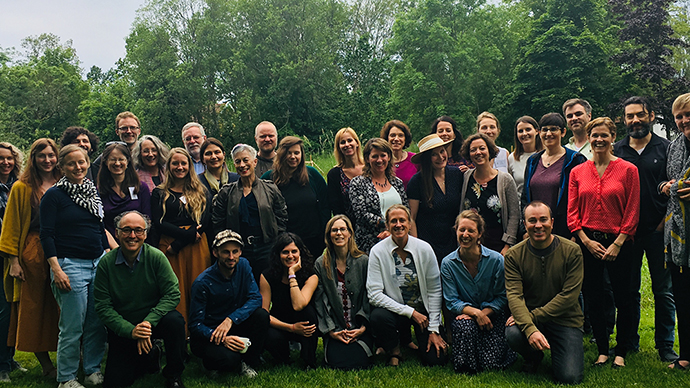The Sixth Assessment Report of the Intergovernmental Panel on Climate Change makes it clear that tweaking business-as-usual will not suffice if we take the multiple and interacting global crises of the twenty-first century seriously.
It is urgent that we go beyond quick-fixes and transform within and across multiple spheres. Previous academic literature has engaged extensively with envisioning what transformations might look like in practice. This new Special Feature in the journal Sustainability Science pushes the conversation further by discussing how we can bring about transformations that are just, equitable and enduring. In other words, how we can go beyond talking about transformation—more “blah blah blah”—and instead move toward action for transformative results.
This Special Feature was first envisioned at an international symposium organized by the AdaptationCONNECTS research project in 2019. The ‘Alchemy of Adaptation’ symposium explored aspects of climate change adaptation that are not adequately considered within sustainability research and practices. At the symposium, participants explored what a broader, deeper, and more integrative approach to adaptation might look like and how new perspectives can contribute to transformations at the rate, scale and depth called for by social-ecological challenges such as climate change.

The Special Feature on ‘The “How” of Transformation: Integrative Approaches to Sustainability’ consists of 15 articles that each approach how from a unique entry point.
In the editorial, ‘Beyond “blah blah blah: exploring the “how” of transformation’, Special Feature editors Bentz, O’Brien and Scoville-Simonds position the Special Feature as responding to the need for going beyond talking about transformation—the “blah blah blah”—and moving toward action for results. They do so by distinguishing between the means of transformation and the manner of transformation, two key dimensions to answering the question of “how”. While means refers to the many solutions that are seen as significant to transformative change, the manner represents how something is done and the values, principles and qualities underpinning and motivating transformative change. The 14 remaining articles in the Special Feature describe different ways of integrating the means and the manner in transformation processes, including through integrating meaning making, integrating learning and listening, and integrating diverse ways of being and becoming.
This special feature is a product of AdaptationCONNECTS, a five-year project based at the University of Oslo and funded by the Research Council of Norway. The illustration in this news article is done by Burcu Koleli, a collaboration made possible by Climate Illustrated.
Special Feature: 'The "How" of Transformation: Integrative Approaches to Sustainability'.
Overview of the 15 articles:
Bentz, J., O’Brien, K. & Scoville-Simonds, M. Beyond “blah blah blah”: exploring the “how” of transformation. Sustain Sci 17, 497–506 (2022). https://doi.org/10.1007/s11625-022-01123-0
Rosenberg, M.N. What matters? The role of values in transformations toward sustainability: a case study of coffee production in Burundi. Sustain Sci 17, 507–518 (2022). https://doi.org/10.1007/s11625-021-00974-3
Hochachka, G. Finding shared meaning in the Anthropocene: engaging diverse perspectives on climate change. Sustain Sci 17, 519–539 (2022). https://doi.org/10.1007/s11625-021-00965-4
Riedy, C. Discursive entrepreneurship: ethical meaning-making as a transformative practice for sustainable futures. Sustain Sci 17, 541–554 (2022). https://doi.org/10.1007/s11625-021-00978-z
Essebo, M. Storying COVID-19: fear, digitalisation, and the transformational potential of storytelling. Sustain Sci 17, 555–564 (2022). https://doi.org/10.1007/s11625-021-01031-9
Tàbara, J.D., Lieu, J., Zaman, R. et al. On the discovery and enactment of positive socio-ecological tipping points: insights from energy systems interventions in Bangladesh and Indonesia. Sustain Sci 17, 565–571 (2022). https://doi.org/10.1007/s11625-021-01050-6
Leichenko, R., Gram-Hanssen, I. & O’Brien, K. Teaching the “how” of transformation.Sustain Sci 17, 573–584 (2022). https://doi.org/10.1007/s11625-021-00964-5
Day, C., Cramer, S. Transforming to a regenerative U.S. agriculture: the role of policy, process, and education. Sustain Sci 17, 585–601 (2022). https://doi.org/10.1007/s11625-021-01041-7
Gosnell, H. Regenerating soil, regenerating soul: an integral approach to understanding agricultural transformation. Sustain Sci 17, 603–620 (2022). https://doi.org/10.1007/s11625-021-00993-0
Ojha, H., Nightingale, A.J., Gonda, N. et al. Transforming environmental governance: critical action intellectuals and their praxis in the field. Sustain Sci 17, 621–635 (2022). https://doi.org/10.1007/s11625-022-01108-z
Veland, S., Gram-Hanssen, I., Maggs, D. et al. Can the sustainable development goals harness the means and the manner of transformation?. Sustain Sci 17, 637–651 (2022). https://doi.org/10.1007/s11625-021-01032-8
Vogel, C., O’Brien, K. Getting to the heart of transformation. Sustain Sci 17, 653–659 (2022). https://doi.org/10.1007/s11625-021-01016-8
Robinson, J. Sustainability as transmutation: an alchemical interpretation of a transformation to sustainability. Sustain Sci 17, 661–672 (2022). https://doi.org/10.1007/s11625-021-00987-y
Gram-Hanssen, I., Schafenacker, N. & Bentz, J. Decolonizing transformations through ‘right relations’. Sustain Sci 17, 673–685 (2022). https://doi.org/10.1007/s11625-021-00960-9
Bentz, J., do Carmo, L., Schafenacker, N. et al. Creative, embodied practices, and the potentialities for sustainability transformations. Sustain Sci 17, 687–699 (2022). https://doi.org/10.1007/s11625-021-01000-2
